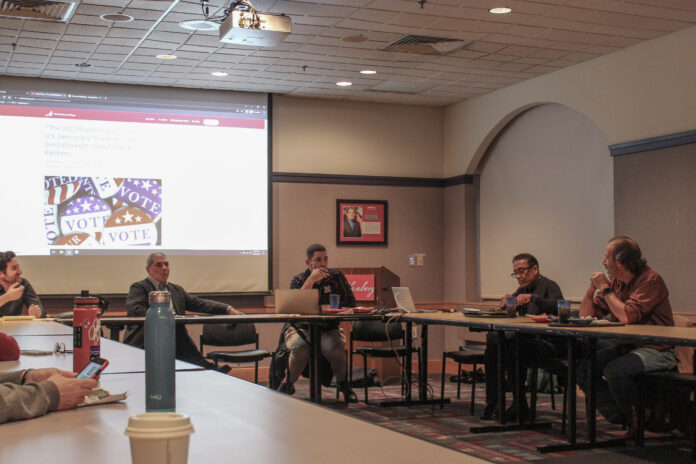
As Pennsylvania plans to welcome a new set of leaders, including Senator-elect John Fetterman, Governor-elect Josh Shapiro (and the reelection of Representative Susan Wild), Muhlenberg’s political science department is revamping its “Midterms” series, beginning with the Election Postmortem Event. Led by Professors of Political Science Brian Mello, Ph.D., Jack Gambino, Ph.D., and Chris Borick, Ph.D., was a round-table presentation and conversation on the fresh midterm election decisions and voters.
To begin, Borick discussed the history of the two-party system in regard to midterm elections. Traditionally, he noted, the current president’s party is put at a disadvantage, as the party not in the White House feels threatened by the lack of congressional control. However, this was not the case in the 2022 midterms; in fact, Democrats kept their control of the Senate, and though it is still uncertain which party will have a lead in the House of Representatives upon installation, it is not as overwhelmingly Republican as would’ve been historically predicted. This brings up the question of why the Democratic candidates were able to prevail in such an unprecedented way this election season.
From this point on, each speaker referenced two key motivating factors for this result: reproductive rights and the influence of former President Donald Trump. Borick stated that the importance of reproductive rights and the power given to the states finally gave people something worth voting for—their own human rights. Student attendee Maya Brooks ‘24 stated, “Pollsters underestimated the impact of Dobbs [v. Jackson Women’s Health Organization] because it affects a number of voters that don’t have to pretend to be impacted anymore. White women are realizing that they have something to lose; they’re now voting for themselves.” Borick also included that the Trump-endorsed candidates were not set up to win upon this endorsement. In Pennsylvania specifically, Doug Mastriano, gubernatorial candidate, and Mehmet Oz, MD, senatorial candidate, were both endorsed by the former commander-in-chief, but in a swing state that is as “purple” as Pennsylvania is, this move created more polarization, and may have caused some Republicans to vote for candidates outside of their party.
Gambino went on to discuss the issue of voter fraud nationally, including a statistic that “71 percent of Americans believed that democracy was threatened, but in the same study, only seven percent thought it was a big issue.” Gambino noted that there were a large number of election-denying candidates that ran for office, and even some that won. For the purpose of this article, “election-denying candidates” or “election deniers” refers to people who believe that the result of the 2020 presidential election between former President Trump and current President Joe Biden is false, or influenced by forms of fraud. Overall, Gambino stated, trust in elections has declined. According to his observations, there are little-to-no signs of voter fraud in the US in any recent elections, something he believes the country should be proud of, but this doesn’t stop it from being a “mobilizing myth.” As a Democratic Michigan voter stated, according to Gambino, the culture has become either “I win” or “you cheated;” and that is not democracy.
Gambino also stressed the topic of democracy in elections, specifically with the amount of money poured into campaigns. A whopping $17 billion (with a B!) was spent on this election cycle alone. This number is not shocking when considering the volume and frequency of political advertising over the past few months. Within the topic of advertising, it was noted that most commercials were “anti-campaigns,” attempting to prevent people from voting for the opposing candidate. Gambino also spoke briefly on the future of the Republican Party. Though they may come to have a slight majority in the Senate, he wonders if the party will be able to have effective government given the divide between Trump-supporting Republicans, and what is now considered more moderate Republicans.
Mello concluded the event by discussing the influence of women on voting. He stated that some are calling this midterm election: “The Year of the Woman.” Though their total representational population in government may have dropped a bit, this election was still historic. Voters nationwide elected the most female governors ever—11—some of them serving their first term this go around. Both Oregon (D) and Arkansas (R) elected their first female governors. One of the most monumental wins came from Massachusetts (D), which elected the first-ever lesbian governor in the United States. If the PA State House changes from Republican to Democrat, he projected that State Representative for PA’s 191st district Joanna McClinton would likely become the first woman to serve as speaker of the Pennsylvania State Legislature.
Mello also referenced the importance of people of color in elections, stating that in Pennsylvania, nine of the 19 non-incumbent women who won House seats were women of color. He also believes that without the votes of women and people of color, Democrats would not be able to win elections, noting that for Pennsylvania, 57 percent of females voted for Fetterman; without them, he wouldn’t have won the race.
Alex McCauley ‘26, a student in attendance, explained how educational and informative the event was for him. “Seeing how experts took the results helped with creating a really informed opinion.” McCauley also referenced how beneficial the provided statistics were in the dialogue, and the effect they had on “show[ing] that this election really wasn’t that much of an anomaly.”
Tonight, Nov. 17, the next event in the election series, “Ugly Freedoms,” is in Miller Forum at 7 p.m.—a public talk by Elisabeth Anker, co-sponsored by the Muhlenberg Political Science Department.
Harry Glicklin '26 is a media & communication and English double major who is absolutely jazzed to be both a Copy Editor and a writer for The Muhlenberg Weekly. Outside of ~the office~, Harry is a member of the Muhlenberg AcaFellas, Hillel and the WMUH Allentown radio station.






















